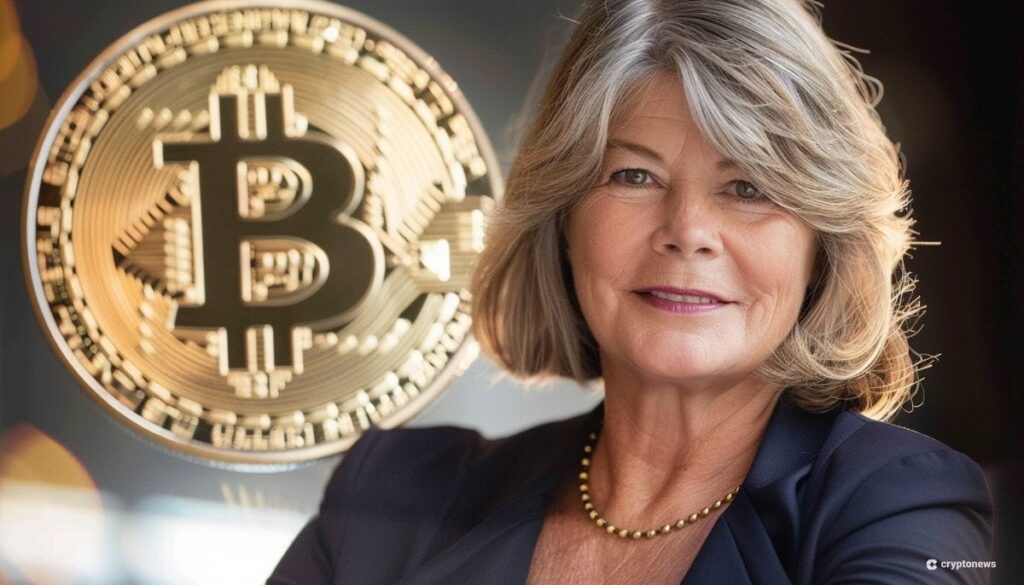In a recent statement, U.S. Senator Cynthia Lummis reaffirmed her strong support for Bitcoin and the wider digital asset ecosystem, stating, “People all over the world are embracing digital assets and digital technology. It’s here to stay and we want the U.S. to be the leader in it.” Senator Lummis’ stance signals an important shift in how lawmakers view the role of cryptocurrencies in the future of finance, particularly as the United States competes to maintain its status as a global financial leader.
Senator Lummis: A Vocal Bitcoin Advocate
Senator Lummis has long been a vocal advocate for Bitcoin and digital assets, and her latest remarks reflect her belief that the U.S. must not only embrace this technological revolution but also position itself as a global leader in the space. Representing Wyoming, a state known for its forward-thinking cryptocurrency regulations, Lummis has continuously pushed for legislation that fosters innovation while ensuring regulatory clarity.
Her vision is simple: If the U.S. leads in digital assets, it can harness the benefits of blockchain technology, such as financial inclusion, increased transparency, and a more decentralized, efficient economy. By contrast, lagging behind could see the U.S. miss out on a massive wave of innovation, capital, and job creation.
Global Adoption of Digital Assets
Lummis’ assertion that “people all over the world are embracing digital assets” rings true as countries around the globe adopt cryptocurrencies at an accelerating pace. From El Salvador’s bold move to make Bitcoin legal tender to the growing adoption of stablecoins in emerging markets for cross-border payments, the demand for decentralized digital assets is undeniable.
Emerging economies, particularly in Latin America, Africa, and Southeast Asia, are leading the charge in utilizing Bitcoin and other cryptocurrencies as alternatives to traditional financial systems, which are often inefficient or plagued by high fees. In countries with unstable currencies or political unrest, digital assets provide a lifeline for individuals seeking financial autonomy and security.
Major companies like Tesla, Square, and even countries such as El Salvador are increasingly incorporating Bitcoin into their financial strategies. The global momentum is unmistakable, and Senator Lummis wants to ensure that the U.S. does not fall behind in this digital revolution.
The Stakes for U.S. Leadership in Crypto
Senator Lummis’ remarks highlight a critical crossroads for U.S. policymakers: Will the U.S. take the lead in the digital asset space, or will it be left behind as other nations adopt more innovative and welcoming regulatory frameworks?
Lummis’ vision of U.S. leadership in Bitcoin and blockchain technology aligns with the country’s broader interests in maintaining global economic dominance. The competition is fierce. Countries like China have already made significant advancements in blockchain technology and central bank digital currencies (CBDCs), while Europe is working on comprehensive cryptocurrency regulations through frameworks like the Markets in Crypto-Assets (MiCA) initiative.
In the U.S., regulatory uncertainty has hindered the full-scale adoption of Bitcoin and other cryptocurrencies. The patchwork of federal and state regulations creates confusion, and several U.S.-based crypto companies have expressed frustration, often threatening to relocate to more crypto-friendly jurisdictions like Dubai or Singapore.
However, Senator Lummis, along with a growing number of policymakers, is determined to change this. She believes that through clear regulatory guidelines and a supportive environment, the U.S. can foster innovation and attract the world’s leading blockchain projects, just as Silicon Valley once did for the tech industry.
Regulatory Clarity and Bitcoin Innovation
One of the key challenges for the U.S. crypto industry is regulatory clarity. Recent actions by the U.S. Securities and Exchange Commission (SEC) have created an atmosphere of uncertainty, especially surrounding Bitcoin exchange-traded funds (ETFs), stablecoins, and decentralized finance (DeFi) platforms. Senator Lummis has been at the forefront of efforts to provide the industry with a well-defined legal framework that encourages growth while protecting consumers and investors.
Senator Lummis has backed bipartisan bills aimed at creating a comprehensive regulatory framework for digital assets. These initiatives seek to clarify which federal agencies are responsible for overseeing various aspects of the crypto market, establish clear definitions for digital assets, and ensure that innovation can flourish within U.S. borders without fear of regulatory retaliation.
U.S. Leadership and Economic Opportunity
The benefits of U.S. leadership in digital assets extend beyond just financial markets. By embracing blockchain and Bitcoin, the U.S. could open the door to a new wave of technological innovation, leading to job creation in areas like fintech, cybersecurity, and blockchain development. This leadership could also improve financial inclusion, providing millions of Americans and global citizens access to better financial services.
Moreover, by taking a proactive role in digital asset regulation, the U.S. could set global standards for how cryptocurrencies and blockchain technologies are governed, much like it did with the internet in the 1990s. Countries around the world look to U.S. regulations as a blueprint, and by establishing thoughtful and innovation-friendly policies, the U.S. can influence how digital assets are integrated into the global financial system.
Conclusion
Senator Lummis’ call for the U.S. to lead in the digital asset space is not just a political stance but a strategic imperative. As Bitcoin and other digital assets continue to reshape the global economy, the U.S. has a critical opportunity to position itself at the forefront of this new financial era.
Lummis’ vision underscores the urgency for the U.S. to act now, crafting regulatory frameworks that encourage innovation while ensuring the safety of consumers. With other nations moving swiftly to adopt digital assets, the U.S. risks being left behind unless it embraces Bitcoin and blockchain technology with open arms.
As Lummis stated, digital assets are “here to stay.” The question now is whether the U.S. will seize the moment and lead this financial revolution or watch from the sidelines as others take the lead.
QUEEN WHALE
Views: 0




